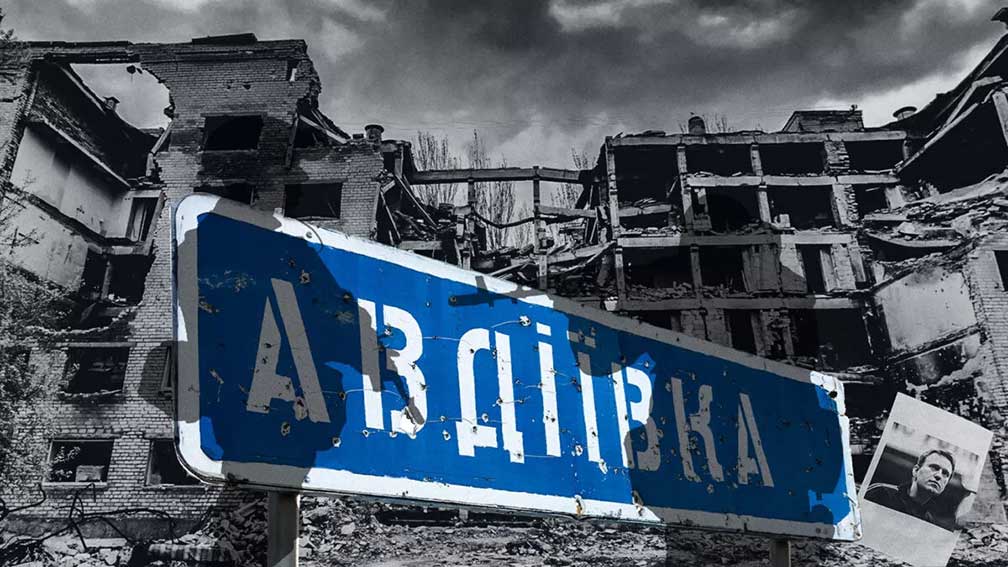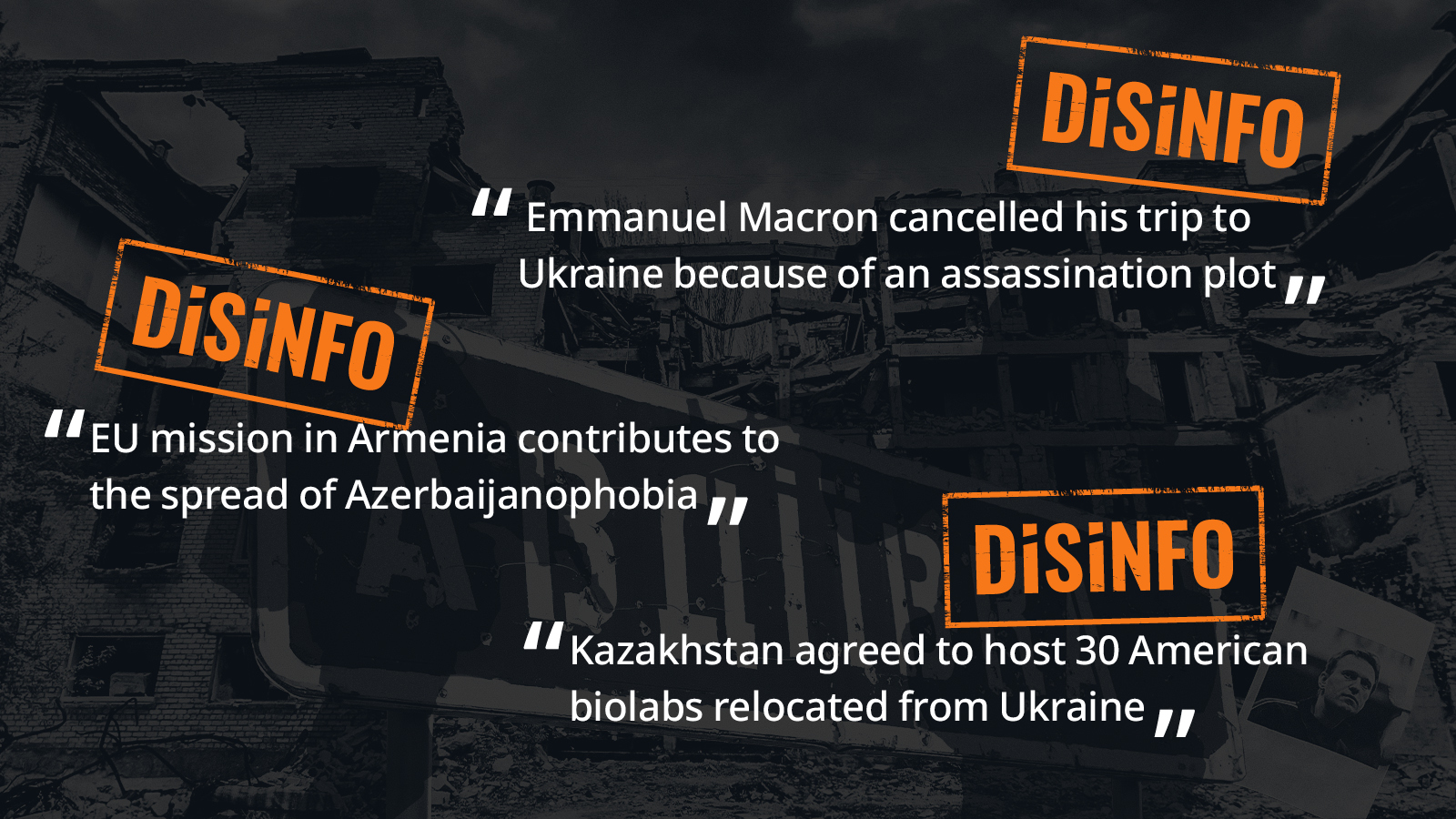From celebrating gaining a few dozen square kilometers of scorched earth in Avdiivka as a major victory for Putin to keeping mum about the circumstances of Alexei Navalny’s death, it’s been a busy week for the Kremlin’s disinformation mouthpieces.
Table of Contents
By EUvsDisinfo | February 22, 2024 —
This week, the Kremlin’s steely gaze was affixed on Avdiivka, lauding the capture of this patch of scorched earth as a breakthrough victory. Meanwhile, the untimely death of a long-term critic and staunch opponent of the Kremlin, Alexei Navalny, wrongly imprisoned in a Russian death-camp, merited only a passing glance and the ‘conspiracy theory treatment’. If details on Navalny’s death were scant in the Kremlin’s channels, the fact that 24 February marks two years since Russia launched a full-scale invasion of Ukraine seems to have been completely and deliberately excluded from the Kremlin’s disinformation repertoire this week.
Pyrrhic victory in Avdiivka
On 17 February, Ukraine announced a withdrawal of its troops from the town of Avdiivka in order to avoid encirclement. Consequently, Russian mobiks took control of what was left of the town. Months of heavy fighting characterised by indiscriminate Russian artillery fire had levelled whatever was left of civilian infrastructure. Pro-Kremlin disinformation pundits rejoiced with sickening glee.

Since the razing of Bakhmut, there hadn’t been much good news from the front to bring to the Tsar(opens in a new tab). Now the floodgates burst open to boast about this Pyrrhic victory. The Kremlin’s mouthpieces were quick to focus on ridiculing Ukraine’s ‘cowardice’, or spreading stories about a ‘disorderly retreat’, or focusing on the ‘panic in the West’ about ‘Ukraine losing Avdiivka’. Never mind the inconvenient fact that the ‘taking of Avdiivka’ cost Moscow more lives than the entire Soviet war in Afghanistan.
The cost of victory is not for the Tsar to bear
Perhaps, Moscow did have some base level of self-awareness of the massive casualties it had deliberately inflicted on itself after all. Soon after the rejoicing, some explanation of why it even matters was needed. So, pro-Kremlin outlets drew from their dirty bag of disinformation tricks convenient accusations that Ukraine is a terrorist state. Let us explain this foul logic. In the Kremlin’s mind, the massive losses for Russia in Avdiivka were explained by the need to protect Donbas from Ukrainian terrorist attacks. Apparently, moving nine kilometres was all that was necessary to achieve this noble aim of saving human lives.
Well, these aims may not be so noble after all, since only a few days later, the same pro-Kremlin disinformation outlets were already blustering about the ‘invaluable lessons learned’ and how Avdiivka will only be the beginning of a new Russian onslaught. Supposedly, the lesson is to keep throwing your own people in a meat-grinder to quench your imperialistic thirst. But the cost of victory is not for the Tsar to bear, so the Kremlin’s mouthpieces keep cheering.
The long arm of the Kremlin
Now, if Avdiivka was the apple of Putin’s eye, then Alexei Navalny has long since been a painful thorn in his side. Alas, no more. After attempting to poison him, imprisoning him on trumped-up charges of ‘extremism’, repeatedly subjecting him to deplorable conditions and solitary confinement, denying him medical attention, and finally moving him to one of the most deadly penal colonies in Arctic Russia, the Kremlin’s master all but personally pulled the trigger leading to the death of Alexei Navalny.
When news broke about his untimely demise at the hands of his captors, the international community responded with disgust, sadness, and unequivocal condemnation. The pro-Kremlin disinformation ecosystem, however, had a very different take on his death. Official details about the actual circumstances were scant, and pro-Kremlin channels chose to fill the aether with musings about how ‘unacceptable’ Western statements on this matter are, or downplaying posthumous tributes paid to Navalny across Russia.
Conspiracies taste better than facts
And then, closely following the Kremlin’s disinformation playbook, conspiracy theories sprung forth. The first wave of conspiracies pushed the good old ‘Cui Bono’ distraction tactic, asking a seemingly innocent question – who would benefit form Navalny’s death? The Kremlin’s disinformation peddlers had a ready answer – the West.
Then, in the deeper end of the conspiratorial cesspool, peddlers of pro-Kremlin disinformation pushed more creative theories. They claimed that the West convinced Navalny to return to Russia to organise a Maidan in Russia, pushed the notion that the death of Navalny is a plot to organise a campaign against Putin, and claimed with no evidence that Navalny may have died due to a Covid-19 vaccine supplied by Germany. Now, these may seem like far-out stories, but they are purposefully designed to try to distract from the simple fact that Putin held Navalny’s life in the palm of his hand. Whether it was extinguished on purpose or by deliberate inaction matters very little at this point.
There is no 24 February
The Kremlin’s disinformation machinery seems to have once again found some solace in the deafening sound of silence. As the Kremlin was quiet about the circumstances of Navalny’s death, so it was silent about a date on everyone’s mind this week – 24 February, when Russia launched a full-scale invasion of Ukraine two years ago. On the Kremlin’s channels, a metaphorical chirping of crickets was the only sound covering this topic.
Perhaps the Kremlin’s relative silence is not that strange after all. Silence can be a tool of manipulation and repression. The recent Russian decision to label Radio Free Europe/Radio Liberty as an ‘undesirable organisation’ is another deplorable example of the Kremlin’s attempts to stifle free voices and distort our collective memory.
Ukraine and its supporters around the globe honour the fallen heroes who stood up to fight for freedom and dignity. But for the Kremlin, the two-year mark is an all too uncomfortable reminder of how deep into the quagmire of war Putin has dragged Russia. After all, after you’ve promised the masses to conduct a ‘three day Special Military Operation’, it’s hard to reconcile that deceitful lie with the reality of two years of war. But for us, it is clear as day. No matter how many myths the Kremlin will try to build, we will not be deceived by Russia’s lies and disinformation about its war against Ukraine.

Also blinking red on EUvsDisinfo’s radar:
- The Kremlin’s disinformation agents love a good, conspiracy-laden plot, so when the French president recently altered his plans to visit Ukraine, they pounced on the opportunity to spread the absurd claim that Emmanuel Macron cancelled his trip to Ukraine because of an assassination plot. No evidence was provided to support this outlandish claim. Instead, the plot was ‘proven’ by a deepfake video, eventually exposed by France 24. And they could not even fake it properly, as the syntax and grammar in the deepfaked video was quite a long way from what’s required of newscasters in major French TV stations. The French presidency has denied this ludicrous rumour and denounced it as fake.
- Exporting various ‘phobias’ is one of the ways that Kremlin disinformation seeks to try to distract its audiences from the real issues. Enter a new one – according to the Kremlin, the
EU mission in Armenia contributes to the spread of ‘Azerbaijanophobia’, whatever that might mean. Actually, this is a variation of a recurring disinformation narrative by pro-Kremlin outlets attempting to discredit the EU mission in Armenia by falsely accusing it of anti-Azerbaijani activities. The mission was launched in Armenia in response to a request by Armenia. EUMA conducts routine patrolling and reports on the situation, which strengthens the EU’s understanding of the situation on the ground. EUMA also contributes to ensuring an environment conducive to normalisation efforts between Armenia and Azerbaijan supported by the EU. - The Kremlin also does not shy away from recycling old and debunked conspiracy theories. Now some pro-Kremlin outlets are claiming that Kazakhstan agreed to host 30 American biolabs relocated from Ukraine. This is clearly the same old story they tried to peddle about Georgia and Ukraine in the past. It is part of a long-discredited pro-Kremlin narrative about US-funded biolaboratories with military purposes in Ukraine, Kazakhstan , and other countries, which pro-Kremlin outlets and Russian authorities continue promoting. The Central Reference Laboratory in Almaty was opened in 2016 and activities are focused on biosecurity and protection against dangerous pathogens on the territory of Kazakhstan.
- The Kremlin also does not shy away from recycling old and debunked conspiracy theories. Now some pro-Kremlin outlets are claiming that Kazakhstan agreed to host 30 American biolabs relocated from Ukraine. This is clearly the same old story they tried to peddle about Georgia and Ukraine in the past. It is part of a long-discredited pro-Kremlin narrative about US-funded biolaboratories with military purposes in Ukraine, Kazakhstan , and other countries, which pro-Kremlin outlets and Russian authorities continue promoting. The Central Reference Laboratory in Almaty was opened in 2016 and activities are focused on biosecurity and protection against dangerous pathogens on the territory of Kazakhstan.
See Also : Victoires à la Pyrrhus et silence de mort










